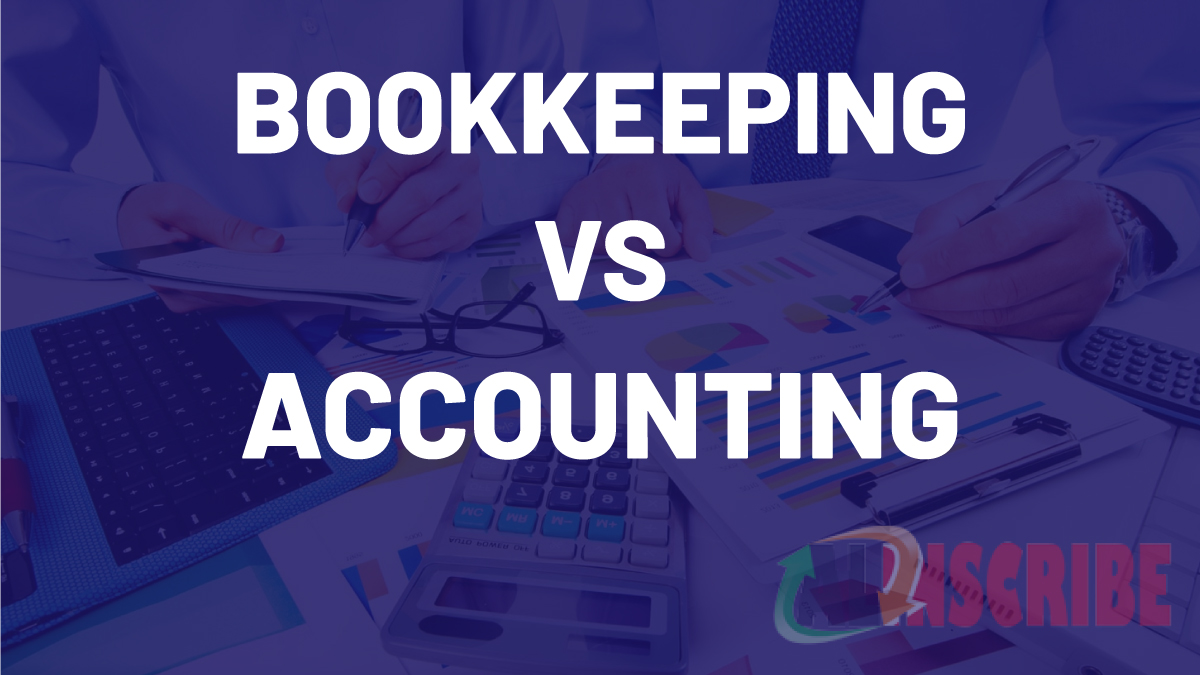Book Keeping Vs. Accounting

In this article, we will learn what is Book keeping and how Book keeping is different from Accounting. Bookkeeping refers basically to the process of record keeping aspects. The process begins from the preparation of source document (invoice) and ends up in the preparation of trial balance and other financial statements. It is an activity which is concerned with the recording of financial data which are relating to business operations in a systematic, significant and orderly manner.
The characteristics of Book keeping are explained below:
- Procedural aspects of accounting work and record keeping function are covered in bookkeeping. For the purpose of recording of financial data, bookkeeping is the process which is used.
- Financial statements are the end product of bookkeeping. Generally, ‘financial statements’ includes the elements of Profit and Loss Account and Balance Sheet including Schedules and Notes forming part of Accounts.
- Generally in the process of bookkeeping until the creation of trial balance, book keeper, may or may not be an accountant, does the recording and maintaining invoices, journal, accounts and trial balance. Preparation of financial documents from the prepared trial balance is normally done by an accountant. Book keeper basically does the clerical jobs related to accounts.
- Bookkeeping is a primary process used for book creation. Primary books of accounts generally include cash book, sales book, purchase book and bank book which all are immediately affected by financial information.
- Bookkeeping is a process which is carried out all through the financial year, to be precise it is a continues and day to day activity. It requires specific differentiation between transactions and events to classify and record relevant financial information and data.
- To depict the correct and current status of financial position is the primary objective of bookkeeping and maintaining the books. It is a very essential aspect to know the present status of expenses, revenue, income, creditors, debtors, cash balance etc.
- In a business it is normal to purchase or sell goods for credit. It is the right of the users, especially the owner to know about these financial information. For example if there is a sale of goods not for cash(as credit), then it is to be recorded in credit sales list, so that it is reminded, and enough procedures are taken for the recovery of debt as soon as possible and the owner or the proprietor will be updated about the debt.
- The proprietor has the rights to know and get updated about the financial inflow and outflow so than he can assess and run the business successfully to earn profit and make sure about the future growth of the business.

Objectives of bookkeeping are basically the following:
Recording of transaction completely.
Records has to permanently and completely prepared and maintained in a proper, systematic, logical and orderly manner.
Measurement and ascertainment of financial effects on the business.
All the financial data has to be assessed and analysed properly to have the combined effect of all the transactions to make decisions and run the business successfully.
Basically there are two types of book keeping
- Single entry bookkeeping:
Single entry book keeping is the method of recording transaction in which the transaction is either recorded in credit column of in the debit column of the respective accounts. - Double entry bookkeeping:
Double entry bookkeeping is the generally followed method of book keeping in which each transaction has dual effects. Each transaction will be having both the credit and debit effect. There will be one credit side entry and one debit side entry in two different accounts or sometimes in the same account (contra entries).

DIFFERENTIATION BETWEEN ACCOUNTING AND BOOK-KEEPING
The differences between Bookkeeping and Accounting can be explained clearly in the form of a table as below:-
| Accounting | Book-keeping |
|
Financial statement preparation is the basic role played by accounting. |
Basis of accounting is from the bookkeeping records. Financial statements never becomes a part of bookkeeping. |
|
Accounting can be again divided into several branches or fields such as financial accounting, management accounting, operational accounting etc |
There are no branches or sub fields for bookkeeping |
|
Considered to be language of business |
Considered to be base of accounting |
|
It is totally dealing with summarising, analysing and presenting the recorded transaction |
It deals will recording aspect of transaction alone |
|
Financial position of the business is ascertained |
Financial position of the business cannot be ascertained |
|
It will assist in managerial decisions |
It will not give much value addition in managerial decisions |
Article Comments
Similar Articles
Articles Search
Sponsor
There are zero sub-categories in this parent category.
There are zero sub-categories in this parent category.
There are zero sub-categories in this parent category.
















